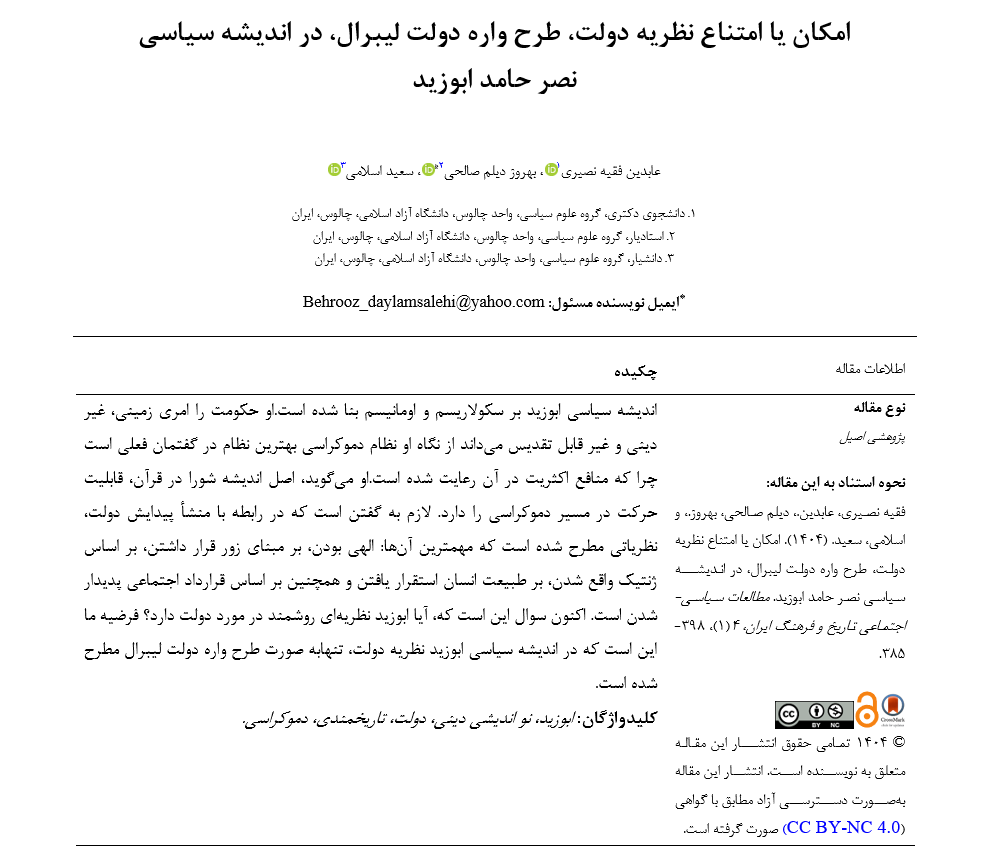امکان یا امتناع نظریه دولت، طرح واره دولت لیبرال، در اندیشه سیاسی نصر حامد ابوزید
کلمات کلیدی:
ابوزید, نو اندیشی دینی, دولت, تاریخمندی, دموکراسیچکیده
اندیشه سیاسی ابوزید بر سکولاریسم و اومانیسم بنا شده است.او حکومت را امری زمینی، غیر دینی و غیر قابل تقدیس میداند از نگاه او نظام دموکراسی بهترین نظام در گفتمان فعلی است چرا که منافع اکثریت در آن رعایت شده است.او میگوید، اصل اندیشه شورا در قرآن، قابلیت حرکت در مسیر دموکراسی را دارد. لازم به گفتن است که در رابطه با منشأ پیدایش دولت، نظریاتی مطرح شده است که مهمترین آنها: الهی بودن، بر مبنای زور قرار داشتن، بر اساس ژنتیک واقع شدن، بر طبیعت انسان استقرار یافتن و همچنین بر اساس قرارداد اجتماعی پدیدار شدن است. اکنون سوال این است که، آیا ابوزید نظریهای روشمند در مورد دولت دارد؟ فرضیه ما این است که در اندیشه سیاسی ابوزید نظریه دولت، تنهابه صورت طرح واره دولت لیبرال مطرح شده است.
دانلودها
مراجع
Abouzeid, N. H. (2004). Critique of Religious Discourse. Yadavaran.
Abouzeid, N. H. (2016). Muhammad (PBUH) and the Verses of God: The Quran and the Future of Islam. Scientific Publishing.
Abouzeid, N. H. (2017). Modernization, Sanction, and Interpretation: From Scientific Understanding to Fear of Takfir. Nashr-e Ney.
Alikhani, A. A. (2004). The Islamic World and the West: The View of Nasr Hamid Abouzeid. Middle Eastern Studies(37), 119-140.
Bagheri Kia, H. (2015). Comparative Explanation of the Philosophical Foundations of the Traditional Approach of Seyyed Hossein Nasr and the Modern Approach of Nasr Hamid Abouzeid in the Pathology of Religious Education. Journal of Research on Foundations of Education(1), 104-122.
Bashirieh, H. (2016). Teaching Political Knowledge (Foundations of Theoretical and Foundational Political Science). Contemporary Look Publishing.
Firahi, D. (2001). Political System and Government in Islam (1): The General Features of Political System and Government in Islam. Political Science - Baqir al-Olum University(14), 139-164.
Hamedi, S. M. (2007). The Influence of Dr. Nasr Hamid Abouzeid by Orientalists. Journal of Quranic Studies by Orientalists(2), 157-192.
Jafari, A. (2011). Post-Rationalist Theories in International Relations. Zeytun-e Sabz Publications.
Kheirjou, S. (2018). Analysis and Critique of Dr. Nasr Hamid Abouzeid's Epistemology of Revelation from the Perspective of Allameh Tabatabai. Journal of Philosophy of Religion Studies(16), 15-33.
Mansourzadeh, M. B., & Masoud, Z. (2017). Examining the Foundations of Political Thoughts Among Neo-Mu'tazilites with Emphasis on the Views of Nasr Hamid Abouzeid. Political Science - Tarbiat Modares University(13), 37-50.
Nasri, A. (2002). Abouzeid and Textual Interpretation in the Historical Horizon. Journal of Qabsat(23), 94-105. https://doi.org/10.1177/153660060202300202
Poladi, K. (2015). History of Political Thought in Iran and Islam. Markaz Publishing.
Pourpirar, N. (2002). A Critique of 'The Meaning of the Text' by Nasr Hamid Abouzeid: The Birth of a New Interpretation. Journal of Golestan Quran(119), 31-37.
Raeisian, G. R., & Zend Aghghati, F. (2017). Pathology of Proving the Historical Nature of the Quran in the Works of Nasr Hamid Abouzeid. Journal of Hasna(33), 8-33.
Sajadi, Z. (2015). Examining and Critiquing Nasr Hamid Abouzeid's View on the Essence of Quranic Revelation. Quranic and Ahl al-Bayt Studies, 1(2), 63-84.
Taheri Kal Keshvandi, M., & Bozouri Nejad, Y. (2016). Exploring the Interpretive Approach of Nasr Hamid Abouzeid in Reading Religious Texts. Journal of Contemporary Muslim Thought Studies(3), 81-92.
Vaezi, A. (2010). A Critique of Nasr Hamid Abouzeid's Concept of the Historicity of the Quran. Quranic Studies(6), 41-64.

دانلود
چاپ شده
ارسال
بازنگری
پذیرش
شماره
نوع مقاله
مجوز
حق نشر 2025 Aabedin Faghih Nasiri (Author); Behrooz Daylam Salehi (Corresponding Author); Saeed Eslami (Author)

این پروژه تحت مجوز بین المللی Creative Commons Attribution-NonCommercial 4.0 می باشد.







